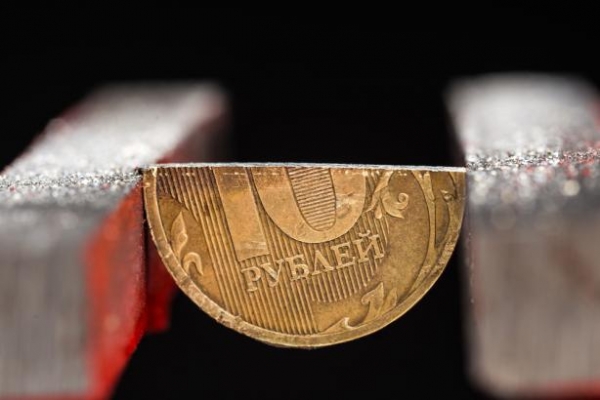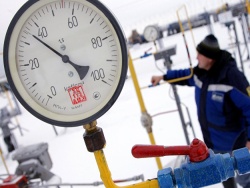A Russian expert at the private intelligence company Stratfor analiticheskoi Lauren Goodrich explains: now the country fell into the same oil trap and the USSR in his last years, and the country needs to choose strategic direction

Russian President Vladimir Putin stands at a crossroads. The situation of the country in a crisis situation is extremely unstable. Can not see a way out of the economic recession, complicated by Western sanctions and sagging oil prices, inflation soared, wages of Russians are falling, and the percentage living below the poverty line is increasing at a rate unprecedented since the financial crisis of 1998. Limited military campaign in Ukraine and Syria stirred nationalistic sentiments, allowing the government to maintain its popularity. Meanwhile, NATO is reinforcing its forces near Russian borders, increasing pressure on the Russian armed forces.
Most of their sixteen years in power, Putin has remained a centrist (by Russian standards).
It is neither radically reformist camp, nor the furious “hawks”-security officials, he is located somewhere in the middle, depending on the situation by supporting one side or the other.
Over the years he tried a variety of management strategies all of the political spectrum, but now the centrist approach is the oscillation between different strategies in order to maintain balance here will cease to be effective. Polarization in the Kremlin and in Russian society in General, forcing the leader to change course.
Usually high-ranking officials and advisers do not criticize Putin publicly, and do not require revision of the strategy of the state. But the growth of instability in Russia, even the Kremlin elite is beginning to Express concern. In may one of the financial advisers, long time working with Putin and two senior officials from the Ministry of Finance published in The National Interest caustic an article criticizing Russia’s dependence on oil revenues and failed government policies not conductive for economic reform. Although the point of view of the authors is nothing new, public criticism from one of the most trusted advisors shows that the discontent in the country has grown so much that it is time for government to make a decision. At the end of may “Vedomosti” was published, not intended for printing, the exchange of opinions between Putin and former Finance Minister Alexei Kudrin, who told the President that he must choose between political ambition and stagnation on the one hand and political modesty and economic growth on the other.
Economic policy of Putin is not the only thing that causes consternation in the Kremlin. In mid-April, the Chairman of the Investigative Committee wrote an article where he claims that in military terms Russia is ill-prepared for a new war.
Destroying open criticism of Putin’s policies in the area of national security from the prominent security officer caused a storm in political and military circles; many have joined Bastrykin calling for a more aggressive defense policy.
Another group of Kremlin “hawks” (“Stolypin club” headed by Boris Titov and Sergei Glazyev in recent months, calls for the severance of economic ties with the West, to ban the use of foreign currency loans from Western creditors and business contacts.
Society in their views on the problem are divided roughly in half. A February poll by the Levada center revealed deep disagreements on economic strategy. 52% of respondents were in favor of the economy controlled by the state, 26% supported the economy of the Western type, and 22% satisfied with current economic model. And although most Russians are concerned about the recession, about 75% support the state’s reluctance to make concessions in respect of Ukraine, which would lead to the easing of Western sanctions. However strong their desire to alleviate the economic situation, the Russians are not ready to sacrifice for the sake of foreign policy. But public demand for economic change is still increasing — the number of protests for economic reasons over the past year increased by 40%.
If you look at the recent history of Russia, this issue may seem familiar. When Leonid Brezhnev in 1964 came to power, the economy of the Soviet Union experienced a collapse. Industrial production is falling rapidly, and Central planning, as it turned out, could not cope with the complexities of the economy of the vast country. Economic theorists and the Soviet elite began to flirt with the idea of decentralization and liberalization of economic and judicial systems. But Brezhnev rejected the proposed reforms and instead relied on a single industry — oil production. From 1960 to 1980, crude oil production in the USSR increased four times and reached 12 million barrels per day; the standard of living in the country proportionately increased. High oil prices have changed the Soviet economy. Defence spending between 1965 and 1970 increased by 40% and continued to grow in subsequent years, peaking in 1982, the last year of life Brezhnev — 15% of GDP. Although investments were made in machinery and agriculture, they looked pale in comparison with spending on national security.
When Brezhnev died in office, the economy was in stagnation, and the arms race with the United States has reached a dangerous point. After the death of two leaders in 1985, the General Secretary of the CPSU became the 54-year-old Mikhail Gorbachev, a relatively young and quick-witted.
He was the head of nursing group leaders, mired in nepotism, corruption and vanity.
Given their advanced years, it is easy to see that they didn’t want anything to jeopardize their comfortable life. And at first, Gorbachev tried to meet their wishes and made no attempts at reform.
But then the Soviet Union faced a series of crises large enough to endanger the entire system. The glut in global oil market in the 1970’s caused the collapse in oil prices — from $38 per barrel (about $117 in current prices) below $10 below $22 in the modern scale). That followed three consecutive lean years in the early 1980s, caused in the USSR in those years, the second world producer of agricultural products, shortage of products. Continued the protracted war in Afghanistan and campaign on a smaller scale in Nicaragua and the Caribbean. Nationalist and Pro-Western movements in Poland and Czechoslovakia threatened the stability of the Soviet bloc, and relations with the United States was harder than usual.
Gorbachev gradually began to see deep fissures in the system. He publicly condemned his predecessors, describing the years of the Brezhnev era of stagnation. Many Soviet citizens during the reign of Brezhnev seemed to be a time of prosperity and military power, when the country was on a par with the United States. Nevertheless, Brezhnev created a structure that was impossible to maintain without an abnormally high oil prices. As a result, the government was forced to deal with the budget deficit and to start making loans in the international markets that would have been unimaginable in previous periods of existence of the Soviet state. In short, the Soviet Union was close to bankruptcy. Meanwhile, at the background of brutal and fruitless war in Afghanistan, shot down by Soviet Armed forces civilian aircraft Korean airlines and the nuclear disaster in Chernobyl, the world began to see cracks in the Foundation of the Soviet system.
Gorbachev wanted to end the Soviet Union or its influence in the world. However, he was forced to reform the system to deal with the inevitable problems.
The Soviet leader withdrew its troops from Afghanistan, reduced the Armed forces and cut defense spending. He established a dialogue with U.S. President Ronald Reagan on nuclear arms reductions began warming relations with the West. And under the slogans of perestroika and glasnost, Gorbachev began a profound political and social reforms. It took years for policy changes, but the result was not the one that counted, the Soviet leader: as we all know, his country has collapsed.
Putin fell into the same trap that landed and Brezhnev, Gorbachev left behind a wreckage. The Russian system is vulnerable to shock loads, both external and internal. Due to the popularity of Putin and the reluctance of his friends to reform it can somehow exist for many years, about the same as deeply sick of the Soviet system in the late 70’s-early 80’s. But it is increasingly clear that the Russians and involved, and not privy to power in the face of problems within the country and external pressure, begin to think about the near future of the country. Decisions made today will determine the fate of the country for decades. The problem is to choose priorities.
The Russians have already felt the hardships of the recession. But if you increase social spending to alleviate its consequences, not enough money for other areas. For the sake of easing public discontent, the Kremlin is seeking support in a country through military campaigns abroad. But the demonstration of military force, Russia makes its strained relations with the West and restricts foreign investment in the country. In turn, the lack of investment exacerbates the recession.
Although for some years Russia can get out of the economic tailspin, the lack of foreign investment today forced to postpone large-scale projects, especially in the oil sector for the future. In the end this will lead to a drop in oil production. Supporters of liberal reforms propose to cut spending on military campaigns abroad and to make concessions on Ukraine and Syria, to restore ties with the West and revive investment.
On the other hand, when NATO strengthens forces on the Russian borders, Moscow needs a strong military presence, not only to protect themselves from possible attacks from the outside, but in order to retain the support of the authorities in the country. And because of this, the country faces another problem.
Russian Armed forces desperately needed modernization, and now if the Kremlin did not Fund it, they permanently lag behind its opponents. But where the Kremlin will take the funds from already skinny in the social budget or the energy sector?
Putin, obviously, the decision to ease international tension and to carry out reforms in the country are intimidating. But the time when you can make decisions individually, depending on the circumstances, coming to an end. Now the need for a strategic plan for the future has become more urgent than ever.
Lauren Goodrich
REFERENCE: Lauren Goodrich is a senior Eurasia analyst and specialist in the Soviet Union.
Her key areas of expertise include politics, business, the economy and security in the CIS.
Ms. Goodrich lived in Russia during the transition period, the Yeltsin-Putin and taught at Tomsk Polytechnic University.
She has diplomas of Tomsk Polytechnic University and the University of Texas at Austin, USA. ( https://www.stratfor.com/content/lauren-goodrich )








